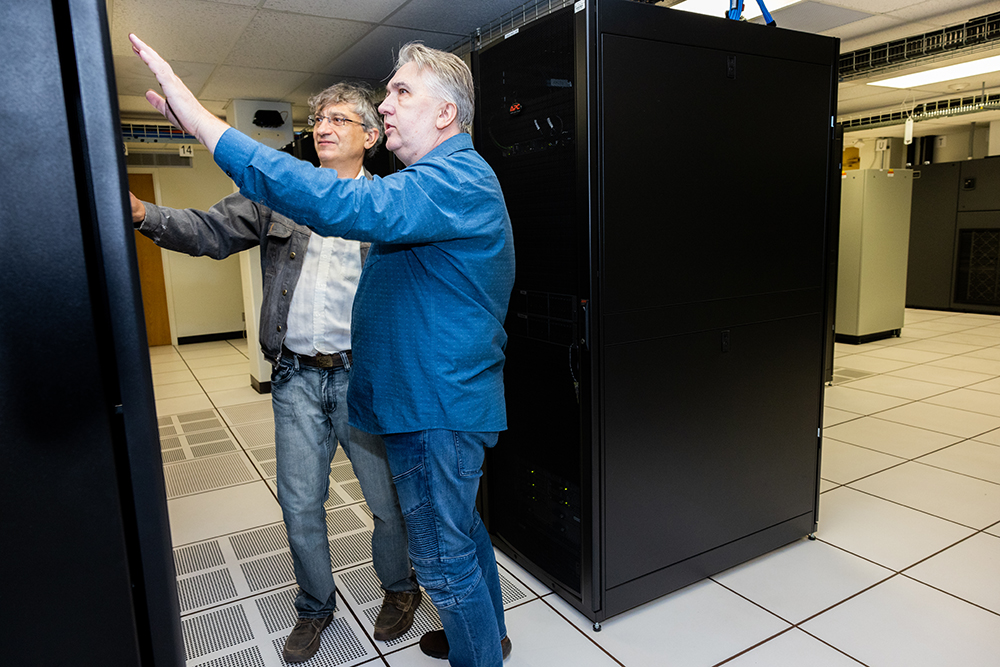DeKalb, IL – The U.S. Department of Energy has awarded NIU Physics Professor Bela Erdelyi and a colleague at Argonne National Laboratory with a $600,000 grant over three years to study a new type of particle accelerator to be used in discovery science.


Professor Bela Erdelyi (blue shirt) and Sergey Uzunyan oversee NIU’s Center for Research Computing and Data, which will be utilized to study a new type of particle accelerator.
Particle accelerator development is an enabling technology that paves the way for applications in our everyday world. In the past, for example, development of accelerator technologies has led to ways to treat cancer, eliminate nuclear waste, scan cargo for security applications, kill food-industry viruses and make shrink wrap.
Particle accelerators also are essential tools of discovery for particle and nuclear physics and for sciences that use x-rays and neutrons, a type of neutral subatomic particle. The accelerators collide abundantly existing particles to create rare, exotic ones that shed light on how the universe works at its most fundamental level.
Erdelyi will serve as the lead investigator of a team that aims to lay the foundation for future, improved particle accelerators, with Brahim Mustapha of the U.S. Department of Energy’s Argonne National Laboratory serving as co-principal investigator.
“The probability of creating new particles worthy of study depends on the amount of initial colliding particles,” Erdelyi said. “However, those particles don’t like each other, or in other words they tend to repel each other. We came up with a new method that would tame them by bunching together more particles into smaller spaces to create more collisions. The project is about a comprehensive study of the physics underlying this method, dubbed ‘circular beam modes.’ ”
Two graduate students will be hired to assist with the study. One will come from NIU’s accelerator physics program, while the other could be a computational science student. The physics student will be stationed at Argonne, which provides a multitude of networking opportunities and state-of-the-art science facilities.
The other student will be able to take advantage of the NIU Center for Research Computing and Data resources, and possibly the Argonne Leadership Computing Facility. The students have not yet been hired; Erdelyi said he hopes to identify them by the start of spring semester.
“It’s a heavily computational job, and I am looking for someone with the right skill set,” Erdelyi said. “It could be someone in the computer science field or in the mathematics field. This is a very good collaboration opportunity, with interface between physics and computational science.”
Awarded in August, Erdelyi’s grant was announced as part of $37 million in DOE funding awarded to 44 institutions across the country to build research capacity, infrastructure and expertise at institutions historically underrepresented in DOE’s Office of Science portfolio, including Minority Serving Institutions and Emerging Research Institutions like NIU.
From 2004 to 2016, Erdelyi held a joint appointment with NIU and Argonne, and he continues to have a close relationship with both Argonne and Fermilab. The university’s proximity to the two institutions is a strong asset, he said.
“The big driving force and the big challenge is to model, simulate and optimize these machines on computers with confidence that you can trust the results,” Erdelyi noted. “You cannot do prototyping. You build it once, and it should work. Otherwise you are in big trouble.”
Over the years, multiyear grant initiatives such as this have helped propel NIU students into their careers—and Erdelyi envisions that to be the case with this grant.
“Historically, NIU has been very good at giving the students a skill set that is complex enough so that they can take different career paths,” he said. “Some stay in academia as professors. Others go into the private sector, and others start their own private companies. These are opportunities to create great connections with national labs and high-performance computing facilities.”
In addition, other NIU students will benefit from the work as Erdelyi incorporates new findings into his own lectures and seminars. “The research will help educate the next generation of accelerator scientists,” Erdelyi said.
About NIU
Northern Illinois University is a student-centered, nationally recognized public research university, with expertise that benefits its region and spans the globe in a wide variety of fields, including the sciences, humanities, arts, business, engineering, education, health and law. Through its main campus in DeKalb, Illinois, and education centers for students and working professionals in Chicago, Naperville, Oregon and Rockford, NIU offers more than 100 areas of study while serving a diverse and international student body.
